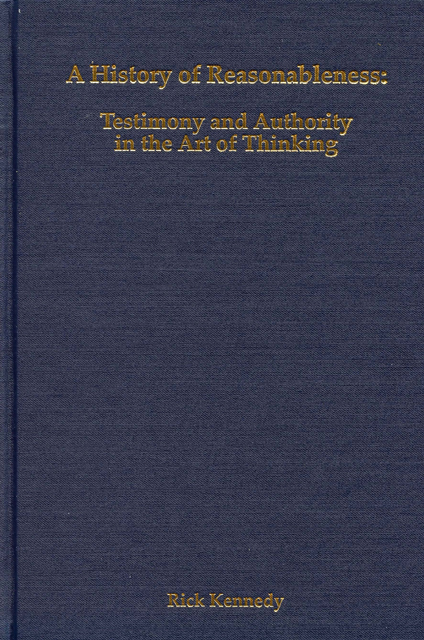Book contents
- Frontmatter
- Dedication
- Contents
- List of Figures
- Acknowledgments
- Introduction: The King of Siam and Assent to the Existence of Ice
- One The Classical Tradition of Testimony in Topics
- Two Three Medieval Traditions: Augustine, Boethius, and Cassiodorus
- Three Two Renaissance Traditions: Ciceronian and Augustinian
- Four The Long Influence of The Port-Royal Logic
- Five Appreciating Aristotle: Thomists, Scots, and Oxford Noetics
- Six Testimony Becomes Experience: The Rise of Critical Thinking
- Bibliography
- Index
Five - Appreciating Aristotle: Thomists, Scots, and Oxford Noetics
Published online by Cambridge University Press: 17 March 2023
- Frontmatter
- Dedication
- Contents
- List of Figures
- Acknowledgments
- Introduction: The King of Siam and Assent to the Existence of Ice
- One The Classical Tradition of Testimony in Topics
- Two Three Medieval Traditions: Augustine, Boethius, and Cassiodorus
- Three Two Renaissance Traditions: Ciceronian and Augustinian
- Four The Long Influence of The Port-Royal Logic
- Five Appreciating Aristotle: Thomists, Scots, and Oxford Noetics
- Six Testimony Becomes Experience: The Rise of Critical Thinking
- Bibliography
- Index
Summary
When it comes to questions of human and divine testimony, wrote John Henry Newman in his An Essay in Aid of a Grammar of Assent (1870), “Aristotle has been my master.” Like his mentor at Oxford, Richard Whately, and the eighteenth- and nineteenth-century Thomists and Scots, Newman believed that education would be best served by reviving the reasoning and reasonableness of Aristotle. First and foremost, he thought, the term “logic” should be reserved for formal reasoning—the study of the structures of valid inference from premises to conclusions. The sources and even the ultimate truth of the knowledge that serves as premises was not germane to whether a valid inference had been drawn. Great advances in the discipline of logic would come from this narrowing of focus. Secondary to this narrowing was Newman’s interest in the venerable tradition of Aristotelian reasonableness, drawn from Aristotle’s other writings on dialectic, rhetoric, ethics, and politics. Newman, being primarily interested in religious reasonableness, reached back to the Nicomachean Ethics to affirm one of the fundamental dichotomies of reasonableness: “a boy may be a mathematician, but not a philosopher.” Syllogistic logic had its proper applications, Newman believed, but cooks do not need to be chemists and masons do not need to be mineralogists. The life of being reasonable was broader, richer, and more subtle than formal reasoning. “Logic,” Newman declared, “makes but a sorry rhetoric.”
So logic textbooks in this revived Aristotelianism became less directed toward teaching testimony and authority. On the other hand, academic subjects were shuffled around as the modern university curriculum developed, and new philosophy departments were still expected to teach general education reasonableness. Here Aristotle was a model, since he had taught not only logic but general reasonableness. Aristotle had initially divided the sources of knowledge into intuition, experience, and information communicated by other people. In the Posterior Analytics, Aristotle had wrestled with intuition and experience as “preliminary problems” to syllogistic demonstrations that yield certainty, and in Topics and Rhetoric he taught the handling of facts and opinions gained from other people that led often to less than certain conclusions. If philosophy departments were going to teach about the former they should hold onto teaching the latter.
- Type
- Chapter
- Information
- A History of ReasonablenessTestimony and Authority in the Art of Thinking, pp. 175 - 226Publisher: Boydell & BrewerPrint publication year: 2004



